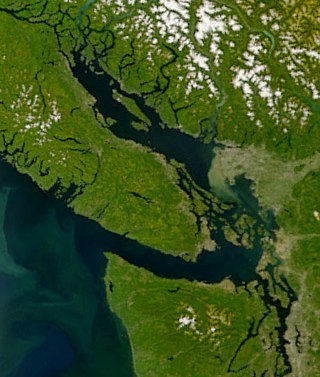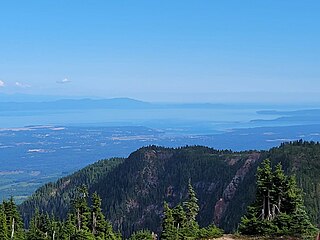
Vancouver Island is an island in the northeastern Pacific Ocean and part of the Canadian province of British Columbia. The island is 456 km (283 mi) in length, 100 km (62 mi) in width at its widest point, and 32,100 km2 (12,400 sq mi) in total area, while 31,285 km2 (12,079 sq mi) are of land. The island is the largest by area and the most populous along the west coasts of the Americas.

Oregon Country was a large region of the Pacific Northwest of North America that was subject to a long dispute between the United Kingdom and the United States in the early 19th century. The boundaries of the area, which had been created by the Treaty of 1818 without recognizing indigenous claims to the area, consisted of the land north of 42° N latitude, south of 54°40′ N latitude, and west of the Rocky Mountains down to the Pacific Ocean and east to the Continental Divide. Article III of the 1818 treaty gave joint control to both nations for ten years, allowed land to be claimed, and guaranteed free navigation to all mercantile trade. However, both countries disputed the terms of the international treaty. Oregon Country was the American name while the British used Columbia District for the region. Meanwhile, Indigenous nations had lived in the area since time immemorial, though with little legal recognition in the American and British legal systems. Evidence along the Salmon River shows people lived there at least 16,000 years ago, and may have populated the continent after migrating along the Pacific Coast, then following up the Columbia River into the interior.

Comox is a town on the southern coast of the Comox Peninsula in the Strait of Georgia on the eastern coast of Vancouver Island, British Columbia. Thousands of years ago, the warm dry summers, mild winters, fertile soil, and abundant sea life attracted First Nations, who called the area kw'umuxws.
Legal aid is the provision of assistance to people who are unable to afford legal representation and access to the court system. Legal aid is regarded as central in providing access to justice by ensuring equality before the law, the right to counsel and the right to a fair trial. This article describes the development of legal aid and its principles, primarily as known in Europe, the Commonwealth of Nations and in the United States.

The Strait of Georgia or the Georgia Strait is an arm of the Salish Sea between Vancouver Island and the extreme southwestern mainland coast of British Columbia, Canada, and the extreme northwestern mainland coast of Washington, United States. It is approximately 240 kilometres (150 mi) long and varies in width from 20 to 58 kilometres. Along with the Strait of Juan de Fuca and Puget Sound, it is a constituent part of the Salish Sea.
Earthjustice is a nonprofit public interest organization based in the United States dedicated to litigating environmental issues. Headquartered in San Francisco, they have an international program, a communications team, and a policy and legislation team in Washington, D.C., along with 14 regional offices across the United States.

Courtenay is a city of about 26,000 on the east coast of Vancouver Island, in the Canadian province of British Columbia. It is the largest community and only city in the area commonly known as the Comox Valley, and the seat of the Comox Valley Regional District, which replaced the Comox-Strathcona Regional District. Courtenay is 4 km (2.5 mi) west of the town of Comox, 7 km (4.3 mi) northeast of the village of Cumberland, 5 km (3.1 mi) northwest of the unincorporated settlement of Royston, and 108 km (67 mi) northwest of Nanaimo. Along with Nanaimo and Victoria, it is home to The Canadian Scottish Regiment, a Primary Reserve infantry regiment of the Canadian Armed Forces.
BC Transit is a provincial crown corporation responsible for coordinating the delivery of public transportation within British Columbia, Canada, outside Greater Vancouver. BC Transit is headquartered in Victoria, British Columbia. In 2022, the system had a ridership of 22,487,400, or about 96,800 per weekday as of the second quarter of 2023.

The Comox Valley is a region on the east coast of Vancouver Island, British Columbia, Canada, that includes the city of Courtenay, the town of Comox, the village of Cumberland, and the unincorporated settlements of Royston, Union Bay, Fanny Bay, Black Creek, and Merville. The communities of Denman Island and Hornby Island are also considered part of the Comox Valley. The Comox Valley contains the 47th largest metropolitan area in Canada with a population of about 76,000 as of 2022.

British Columbia is the westernmost province of Canada, bordered by the Pacific Ocean. With an area of 944,735 km2 (364,764 sq mi) it is Canada's third-largest province. The province is almost four times the size of the United Kingdom and larger than every United States state except Alaska. It is bounded on the northwest by the U.S. state of Alaska, directly north by Yukon and the Northwest Territories, on the east by Alberta, and on the south by the U.S. states of Washington, Idaho, and Montana. Formerly part of the British Empire, the southern border of British Columbia was established by the 1846 Oregon Treaty. The province is dominated by mountain ranges, among them the Canadian Rockies but dominantly the Coast Mountains, Cassiar Mountains, and the Columbia Mountains. Most of the population is concentrated on the Pacific coast, notably in the area of Vancouver, located on the southwestern tip of the mainland, which is known as the Lower Mainland. It is the most mountainous province of Canada.
The Canadian Environmental Law Association (CELA) is a non-profit, public interest organization established in 1970 to use existing laws to protect the environment and to advocate environmental law reforms. It is also a free legal advisory clinic for the public, and will act at hearings and in courts on behalf of citizens or citizens' groups who are otherwise unable to afford legal assistance. Funded by Legal Aid Ontario, CELA is one of 79 community legal clinics located across Ontario, 15 of which offer services in specialized areas of the law. CELA also undertakes additional educational and law reform projects funded by government and private foundations.
Ecojustice Canada, is a Canadian non-profit environmental law organization that provides funding to lawyers to use litigation to defend and protect the environment. Ecojustice is Canada's largest environmental law charity.

The Fundy-class minesweepers were a class of four minesweepers operated by the Royal Canadian Navy during the Second World War. All four ships entered service in 1938 and the class were discarded in 1945, sold for mercantile service. Three ended up sold to Chinese interests, while one remained active in Canada until 1987.
Land is owned in Canada by governments, Indigenous groups, corporations, and individuals. Canada is the second-largest country in the world by area; at 9,093,507 km2 or 3,511,085 mi2 of land. It occupies more than 6% of the Earth's surface.
In 1864 the Vancouver Island Exploring Expedition explored areas of the Colony of Vancouver Island outside the capital of Victoria and settlements in Nanaimo and the Cowichan Valley that were then unknown. The expedition went as far north as the Comox Valley over four and one half months during the summer and fall of 1864. The result was the discovery of gold in one location leading to a minor gold rush, the discovery of coal in the Comox Valley, an historical record of contact with the existing native population, the naming of many geographic features and a series of sketches recording images of the time.
Dogwood BC is a Canadian non-profit public interest group based in Victoria, British Columbia. The organization works to increase the power of British Columbians over government decision-making. They were instrumental in the fight against Enbridge's Northern Gateway pipeline, introducing a tanker moratorium on B.C.'s north coast and the province's campaign finance reform. The organization currently works to stop Kinder Morgan's Trans Mountain tanker and pipeline expansion in B.C., ban U.S. thermal coal exports through B.C. ports and restore accountability and transparency to the province's democracy by calling for a Corruption Inquiry.
Comox Valley Transit System provides public transportation in the Comox Valley area on the east coast of Vancouver Island, British Columbia, Canada. Service is provided to the City of Courtenay and the towns of Comox, Royston, Oyster River, Black Creek, and Cumberland. Funding is provided under a partnership between the Comox Valley Regional District and BC Transit, the provincial agency which plans and manages municipal transit systems.
The Environmental Dispute Resolution Fund (EDRF) is a legal aid program based in British Columbia, Canada, which provides grants to individuals, community groups, and environmental organizations who need to hire legal representation to assist them in resolving an environmental problem or dispute. The grants are provided and administered by West Coast Environmental Law, a non-profit environmental law and public advocacy organization based in Vancouver, British Columbia, Canada. EDRF funding allows grantees to hire lawyers from the private bar. Funding for the EDRF is provided by the Law Foundation of British Columbia.
Gord Johns is a Canadian businessman and politician. Since 2015, he has served as the New Democrat Member of Parliament for the federal electoral riding of Courtenay—Alberni in the House of Commons of Canada. He previously served as a town councillor for Tofino, British Columbia, and founded a number of small businesses.







